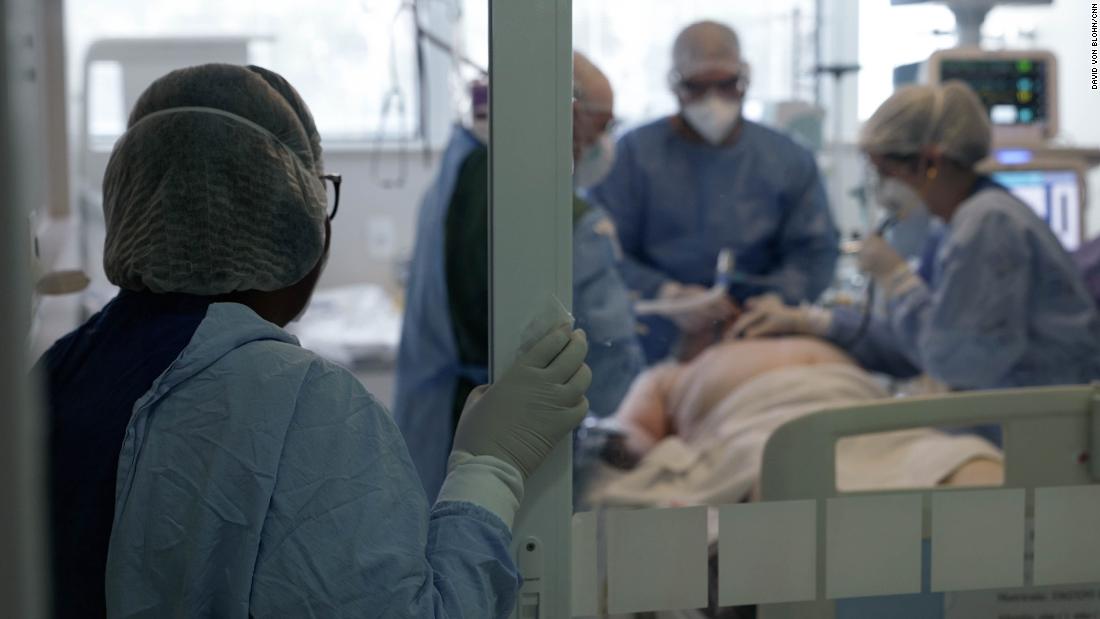Machines beep and buzz, nurses and doctors are confused as they rush to the bedroom of an elderly man who is short of breath. The decision to intubate is made quickly. It is your only chance of survival far from guaranteed.
Among the nearly half dozen in the room, nurse Monica Aparecida Calazans says she has seen many deaths. “I’ve already lost eight of my colleagues to Covid,” she said. “It is such a cruel disease.”
As of Sunday, only 0.5% of the country had received the first dose of AstraZeneca or Sinovac vaccines. Not a single person in Brazil has been fully vaccinated, in addition to some who have participated in clinical vaccine trials.
In addition, vaccine supplies are extremely limited and there is still a surprising lack of detail in government plans to ensure more.
“I would have said that Brazil would be the first”
In June 2020, few thought that Brazil would be struggling so much with its implementation.
The country’s huge national health system, with health professionals present in almost all thousands of Brazilian municipalities through a series of hospitals and clinics, has a long history of successful vaccination of its population.
But several experts say the ineptitude of the federal government, led by skeptical President Jair Bolsonaro, sabotaged his response to the coronavirus. They point to a clear lack of urgency on the part of the federal government to guarantee the supply and a lack of diversification in the supply of vaccines.
“At the beginning of the pandemic, I would have told you that Brazil would be the first country in Latin America to vaccinate its population because we know how to do it,” said Natalia Pasternak, a microbiologist and defender of Brazilian health. “We have all the infrastructure we need. Now we just need a better president.”
Brazilian federal health authorities initially announced an implementation plan similar to that of many other important countries. It would manufacture the AstraZeneca vaccine in the country, producing around 30 million doses by the end of January 2021.
About 200 million more would be produced by the end of the year, administered first to health professionals and the elderly and then in order of vulnerability.
The Brazilian government has clearly placed its initial hopes on the AstraZeneca vaccine. But their vaccine testing took longer than some others, a perfectly normal and predictable possibility, given the unprecedented nature of Covid-19 vaccine development.
The Brazilian vaccine regulatory agency finally granted authorization for emergency use of the AstraZeneca vaccine on January 17, but the lack of the active ingredient needed to make the vaccine means that Brazilian laboratories have not yet started producing hundreds of millions of doses you need.
Supplies are expected to arrive this week, but the delay has practically destroyed the government’s schedule. There is no set date for when finished doses will begin to be shipped.
While large countries with similar purchasing power negotiated deals last year to buy other vaccines from companies like Moderna and Sinovac, Brazil remained steadfast.
Brazil’s health minister even declined an August offer from Pfizer to buy up to 70 million doses of its vaccine. The ministry defended the decision, saying in part that it was concerned about a payment guarantee and an agreement to have contractual issues dealt with in a United States court.
“That’s why you don’t put all your eggs in one basket,” said Pasternak. “There is no reasonable explanation for not planning in advance how you are going to vaccinate your population.”
Still, Bolsonaro recently said that no government “would do better than what my government is doing”.
Bolsonaro’s flip-flop in China
Brazil’s biggest hope for a short-term vaccine supply is probably CoronaVac, developed by the Chinese company Sinovac. Regulators approved its emergency use on January 17 and the Bolsonaro government approved the purchase of 100 million doses.
He was inclined to discredit the vaccine when the governor of São Paulo, João Doria, an important political rival and likely competitor in the 2022 presidential race, embraced her.
Doria bypassed the Bolsonaro government and negotiated directly with China the vaccine against Sinovac, ultimately guaranteeing millions of doses. Doria says the president’s inertia in securing supplies forced his hand. “In Brazil, we have to fight two viruses, the coronavirus and the Bolsonaro virus,” said Doria in an interview.
Doria was forced to hand over the supply of his Chinese-made vaccine to the federal government. “We must [vaccinate] faster than we are going now, “he said.” We need more vaccines, but that responsibility lies with the federal government. “
Both men may now be stuck with a vaccine that appears to be less effective than others. Recent data show that the CoronaVac vaccine is 50.4% effective, eliminating the WHO guideline of 50% by the smallest margin.
Bolsonaro said that in addition to the purchase agreements already in place, his government will buy vaccines as soon as they become available. It is a vague statement, considering that vaccines are among the most sought after commodities in the world.
Angry, frustrated and helpless
The confusion and frustration with the vaccine launch in Brazil comes at a time when the outbreak in Brazil has never been worse.
In addition to the daily increases in cases and deaths that are among the highest in the pandemic so far, a new variant of Covid -19 has emerged that epidemiologists say is probably more easily transmitted and can be more lethal.
Vaccines are needed more than ever, but now that supply just doesn’t exist. Júlio César Barbosa, a nurse who works at a public hospital in São Paulo, offered to vaccinate people, but says he feels powerless amid scarcity. “I am concerned and angry with our government because from the beginning they have trivialized this virus.”
CNN’s Natalie Gallón contributed to this report.
